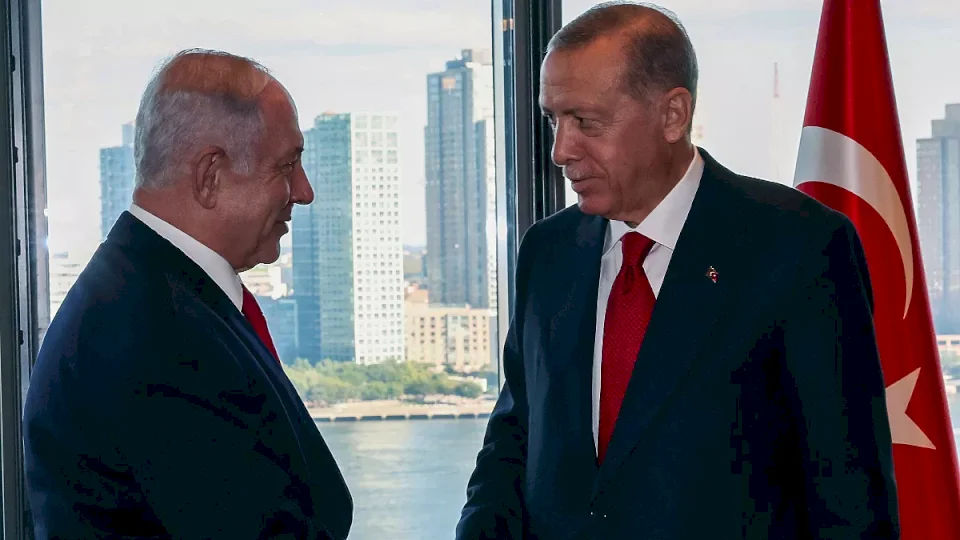
Report: Israel Seeks to Reduce Tensions with Turkey with American Help
SadaNews - The general Israeli discourse describes Turkey as an enemy, echoing the sentiment that "Turkey is the new Iran" for Israel. However, a new report published today, Monday, by the "Institute for National Security Studies" at Tel Aviv University considers this a problematic statement, "as it downplays the still-present Iranian threat," and notes that "there are diplomatic relations and limited intelligence cooperation between Israel and Turkey. Furthermore, Turkey is a NATO member and maintains close relations with the West, and there are no indications that it is trying to establish a network of organizations against Israel."
The report states that the anti-Turkey rhetoric in Israel "reflects Israeli fears of Ankara in several areas, most of which relate to Turkey's growing presence in Syria after the fall of the Assad regime and its influence on settlements in Gaza following the ceasefire, especially if accompanied by the entry of Turkish forces as part of an international force into the sector," despite the fact that Israel has occupied Syrian territories since the fall of Assad and has not fully halted fire in Gaza.
There is growing concern in Israel regarding what the report describes as "Turkey's superiority in the Eastern Mediterranean granted to it by its fleet, coupled with its growing military strength, which enhances its status in Washington and other Western capitals, and Ankara's hardline rhetoric" towards Israel in the aftermath of the genocide in Gaza.
According to the report, the main problem between Israel and Turkey "stems from Ankara's view that the continued presence of Hamas in the 'next day' is a significant player, even if behind the scenes, a central goal, while Israel opposed throughout the war any Turkish role in a settlement in Gaza," claiming that Turkey has continued to support Hamas following the October 7 attack and that Turkish statements against Israel during the war were harsher than the criticisms from other countries.
However, the report also noted that "Turkey played an important role in pressuring Hamas to agree to a ceasefire in October last year," and that U.S. President Donald Trump sees Turkish President Recep Tayyip Erdoğan as a "person capable of solving his problems in the Middle East and 'ending wars', attributing the success in liberating all living hostages to the efforts of the Turkish president."
Israel fears a Turkish military presence in central and southern Syria and restrictions on Israeli Air Force operations in Syrian airspace. The report highlighted Israel's concerns that "it is expected that part of the trade and energy routes that Turkey is trying to push there will bypass Israel in a way that poses a risk to projects that Israel is interested in, including those related to developing the India-Middle East-Europe corridor."
The report stated that "developments in the Syrian arena serve as a model for Turkey's and Israel's fears of an aerial confrontation between them. The willingness of both sides to operate with the help of a 'hotline' established following talks between Turkish and Israeli officials in Baku, encouraged by the U.S., is a bright signal that both sides are deterred from a direct confrontation. Israel and Syria are moving towards a security agreement that is expected to contribute to a certain calming between Israel and Turkey in the Syrian arena."
Despite the economic boycott that Turkey declared against Israel in May 2024, which is still in effect, the report noted that during this period Turkish goods continued to reach Israel through third countries and Palestinian traders. "The fact that trade volume remains significant despite the restrictions indicates the strong interest among businessmen on both sides in trading with each other," despite the cessation of air traffic between the two sides following the outbreak of war in Gaza.
According to the report, "one cannot ignore the growing military strength of Turkey. Ankara has identified three weaknesses in the Turkish army and is working diligently to address them, particularly following the lessons learned from the 12-day war between Israel and Iran."
One of the weaknesses is the aging fighter planes and the necessity to purchase new ones. Last month, Turkey signed a deal with Britain to buy 20 Eurofighter Typhoon fighter jets and is on the verge of purchasing 24 used planes of the same model from the UAE, aimed at overcoming the timeline problem for obtaining new aircraft.
Turkey is also advancing in the field of air defense and aims to manufacture an "Iron Dome" system, having significantly expanded permits to build shelters across the country. During the war between Israel and Iran, Erdoğan stated about the necessity for Turkey to be equipped with medium and long-range ballistic missiles for deterrence, according to the report.
The report noted that "there is interest in Israel for the United States to be involved in easing tensions between Israel and Turkey. Practically, it appears that the intervention of President Trump and high-level officials in the U.S. administration will assist in this at this stage."
However, the report added that "the United States must also recognize that Israel will not soften its opposition to the deployment of Turkish forces as part of the international stabilization force being formed in Gaza due to the deep-seated distrust between the two countries."

Israeli Estimates: The Iranian Ballistic Threat Will Remain and the Rate of Its Attacks Wi...

The Hague Group Holds an Emergency Meeting on March 4, 2026, Regarding Accountability and...

The President to His Lebanese Counterpart: We Support Any Steps Taken by Lebanon to Achiev...

Report: America Begins Attacking Iranian Nuclear Targets

Rutte Praises the War on Iran but Confirms NATO's Non-Involvement

"No Backing Down and Good Luck".. Behind the Scenes of Trump's Final Decision to Strike Ir...

Israeli Chief of Staff: We Will Not End the Battle Before Eliminating the Threat from Leba...

